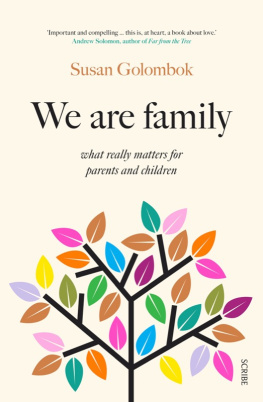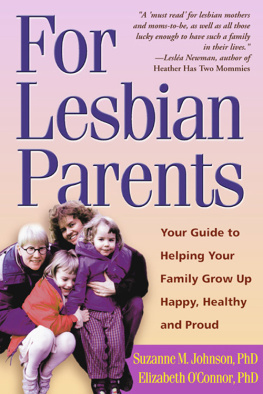Acknowledgments
This project has involved many people along the waytoo many to acknowledge by name here. The exploratory discussions I had on this topic with Harriet Whitehead were followed by more formal conversations with Susan Griffin, Shirley Johnson, Marcia Kallen, and Ina Jane Wundrum. Their advice was essential to the first formulations of a research design, as were the comments and suggestions of therapists, attorneys, researchers, and community service providers whom I talked with early on. Among those who contributed in this way are Alice Abarbanel, Roberta Achtenberg, Susan Bender, Ricki Boden, Barbara Bryant, Christa Donaldson, Renee Epstein, Marilyn Fabe, Ann Garrett, Sherry Glucoft, Margo Hagaman, Carol Hastie, Donna Hitchens, Sheila Israel, Carol Jausch, Katy King, Camille LeGrand, Jill Lippett, Phyllis Lyon, Janice Macombers, Del Martin, Sandra Meyers, Mary Morgan, Byron Nestor, Pat Norman, Saralie Pennington, Cheri Pies, Barbara Price, Sue Saperstein, Donna Scott, John Sikorski, the late Fay Stender, Sarita Waite, Norma Wikler, and Yvette Williams. A meeting early in the project with Mary Jo Risher and Ann Foreman clarified my understanding of the long-term impact of custody litigation on lesbian mothers lives.
Most vital to the completion of this very lengthy project were the 135 mothers who opened up their lives to me, taking hours to share their experiences and their feelings with little indication of how these confidences would be employed. I cannot acknowledge them by name, but I hope they will find something in this volume that will compensate them for the time they devoted to telling me about themselves.
The work of Terrie A. Lyons as research associate was fundamental to the successful design of the study and collection of data. I have benefited enormously from conversations with her about the interpretation of the findings and was constantly challenged by the clinical perspective she brought to her understanding of the mothers lives and decisions.
Colleagues and staff at the University of California, San Francisco, and at other Bay Area institutions made tremendous contributions to this project. Victoria Peguillan and Sheryl Ruzek contributed to the preparation of the original proposal, along with staff members at Scientific Analysis Corporation in San Francisco. Betty Kalis was invaluable to the project as a consultant during the preparation of the interview schedule. Beverly Cubbage, Barbara Jordan, and Andrea Temkin had the major responsibility for the transcription of the interviews, aided by other staff from the Medical Anthropology Program and the University clerical pool.
As the project continued, Linnea Klee and Judith Barker served very ably as research assistants. Alan Bostrom trained project staff in the use of SPSS. Margaret Clark, Carol McClain, Ann W. Merrill, Virginia Olesen, and Harry F. Todd, Jr., provided advice and encouragement.
When I began this project, other research efforts in related areas were beginning as well. There was a tremendous amount of sharing among those of us who were undertaking this work, and our interactions were remarkably free of competitive feelings. Those whose collegiality I especially appreciated were Beverly Hoeffer, Mary Hotvedt, Martha Kirkpatrick, Jane Mandel, and Daniel Ostrow.
The preparation of this book in its final form owes an immeasurable debt to those colleagues and friends who spent many hours reading, evaluating, and criticizing the various drafts of the manuscript. I thank especially Mary Anglin, Melinda Cuthbert, Julie Hemker, Lois Helmbold, Kathleen Jones, Esther Newton, and Wendy Sarvasy for the important contributions they made to this work. I also thank Earl Klee for his useful suggestions in regard to Chapter 9.
An earlier version of Chapter 8 appeared in Uncertain Terms: Negotiating Gender in American Culture , edited by Faye Ginsburg and Anna Tsing; their insightful comments while I was preparing that paper were enormously helpful to me as I returned to the larger project of this book. I thank them and Beacon Press for permission to use the material here. I also presented portions of the book at a Wenner-Gren symposium on the politics of reproduction in November 1991. The critiques of all the symposium participants, but especially those of Rosalind Pollack Petchesky and Shellee Colen, and of the organizers, Rayna Rapp and Faye Ginsburg, were central to the thinking I have done since then in trying to understand what I have accomplished in this project and what I need to do next. Carole Browner read the penultimate version of the manuscript with great care. She has known me so long that she knows what I mean to say when even Im not sure, so she was often able to help me unravel my most wayward sentences. Most particularly, I acknowledge the meticulous comments Kath Weston offered on the entire manuscript in its final stages; her eye for detail and her clear understanding of what I was really trying to achieve prevented me from losing track of my own objectives. As series editor, Roger Sanjek has been consistently supportive, offering incisive comments even as he must have wondered whether I was ever going to finish. Peter Agree, of Cornell University Press, has been cheerful and encouraging throughout the preparation of the book and I am grateful for his patience.
This project could never have been completed without the support of the National Institute of Mental Health (Grant MH-30980) and the Rockefeller Foundation Gender Roles Program. Also essential to its completion have been the support and encouragement of valued friends: Dennis DeBiase, Mary L. Hackney, Ann W. Merrill, Esther Newton, the late Barbara Rosenblum, and Helene Wenzel. I thank them for their confidence in me and their willingness to challenge me during my many bouts of anxiety and self-doubt. Most particularly, I owe a boundless debt to Liz Goodman, whose resilience has never wavered and whose ability to shore up my sagging spirits has been without limits.
E LLEN L EWIN
San Francisco, California








